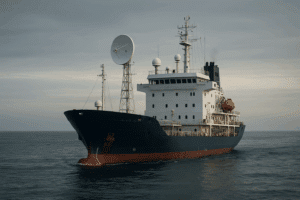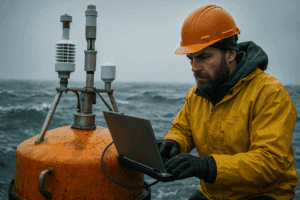Over 90% of global trade travels by sea, making maritime shipping the backbone of the world’s economy. This dynamic industry extends far beyond traditional seafaring. It encompasses diverse roles requiring specialized skills in areas like logistics, finance, and engineering. As regulations constantly evolve and technology plays an increasingly crucial role, maritime professionals must continually update their knowledge and skill sets to stay ahead of the curve. This article explores the key trends shaping naval education and the exciting career opportunities awaiting those ready to navigate this dynamic field in 2024.
Why are maritime education and training essential?
Maritime education and training are essential for ensuring safety, efficiency, and sustainability, which are the industry’s priorities. All commercial vessels, from massive container ships to smaller tankers and ferries, are complex machines that operate in a demanding environment. Only a highly skilled workforce can navigate challenging situations, respond to emergencies effectively, and prevent accidents. This minimizes risks to the crew, passengers, cargo, and the marine environment.
On a broader scale, by leveraging their logistics expertise, they ensure the seamless movement of goods across borders, minimizing disruptions in global supply chains through coordinated efforts with related sectors.
Lastly, the maritime industry is heavily regulated to ensure safety and environmental protection. Well-trained professionals understand and adhere to these regulations, preventing pollution and ensuring responsible waste disposal.
Key trends in maritime education
The maritime industry is undergoing a significant transformation driven by technological advancements, environmental concerns, and evolving regulations. This necessitates a parallel evolution in maritime education to allow the workforce to adapt to this changing landscape.
Increasing importance of technology
Curriculums will increasingly incorporate training on automation technologies like autonomous vessels, remote helming, digitalized equipment, and processes. Students have to learn to operate and troubleshoot these systems, ensuring safe and efficient vessel operations.
Maritime education will emphasize data analysis skills to interpret and utilize data collected from onboard sensors and various maritime information systems. This will be crucial for optimizing vessel performance, improving efficiency, and making data-driven decisions.
And as the industry becomes more reliant on technology, cybersecurity threats will become a growing concern. Courses will include cybersecurity awareness modules so that professionals can identify and mitigate cyber risks.

Smart learning for smarter seafarers
In 2024 and the coming years, the use of online learning platforms and blended learning approaches (combining online modules with classroom sessions) will rise to provide flexible and accessible training opportunities.
Virtual Reality (VR) and Augmented Reality (AR) will be increasingly used to create immersive simulations that provide realistic scenarios for practicing navigation, emergency procedures, and equipment operations in a safe and controlled environment. Besides, gamification techniques will be adopted to engage students and make learning more interactive and enjoyable. In this regard, game mechanics like points, badges, and leaderboards can be incorporated into training modules.
Focus on sustainability and environmental protection
Courses dedicated to maritime professionals will give a prominent place to green technologies such as alternative fuels, energy-efficient ship designs, and waste management practices. The aim is to enable them to contribute to minimizing the environmental impact of shipping operations. Through the understanding of international regulations related to environmental protection, such as MARPOL (International Convention for the Prevention of Pollution from Ships), students will gain a deeper understanding of their responsibilities in protecting the marine environment.
Development of soft skills
In addition to technical skills, maritime education will include modules to develop soft skills such as communication, teamwork, leadership, and problem-solving, etc., which are crucial for effective collaboration in a multicultural and fast-paced environment.
Global collaboration and standardization
Shortly, there will be a growing emphasis on harmonizing training standards across different countries. This will ensure that employees in the maritime industry meet the same level of competence regardless of their origin. This means that international education institutions will collaborate more closely on developing and delivering training programs, promoting the exchange of knowledge and best practices on a global scale.
Lastly, in the constantly evolving maritime world, professionals need to continuously update their skills to remain relevant. Education providers will offer a wider range of short courses and specialized training programs to facilitate continuous learning and upskilling. On top of a strong foundation, individuals can specialize in specific areas, take on leadership roles, and build successful careers.
Career types in the maritime industry
Maritime shipping thrives on a well-oiled network of interconnected sectors. This dynamic industry offers a diverse range of career paths, encompassing roles on land and at sea, each requiring a unique set of in-demand skills. Together, they contribute to a high-performing global supply chain.
Seafaring careers
- The deck officers are responsible for the safe navigation and operation of the ship (captain, chief mate, watch officer…).
- The marine engineers oversee the propulsion, maintenance, and repair of the ship’s machinery and onboard systems (chief engineer, second engineer, and third engineer).
- The ratings (deck and engine) perform various tasks essential for ship operations, such as lookout, deckhands, and engine room mechanics.

Port and terminal operations
Ports and terminals provide essential infrastructure and services for maritime shipping, including berths for ships to dock, equipment for handling cargo loading and unloading, and storage facilities for containers or bulk cargo.
- The port operations manager oversees the efficient flow of cargo and vessel traffic within a port.
- The terminal manager handles operations at a specific cargo terminal, such as a container terminal or bulk cargo terminal.
- The cargo surveyor inspects cargo for damage or discrepancies before loading or unloading.
- The dockworkers are responsible for the physical loading and unloading of the cargo from ships.
Maritime logistics
In maritime shipping, logistics companies coordinate the movement of the cargo between ports of origin and destination, or at transshipment points, including inland transportation by truck or rail.
- The freight forwarder arranges the transportation of goods between origin and destination, including customs clearance and documentation.
- The logistics coordinator plans and manages the movement of cargo through the supply chain, ensuring timely and cost-effective delivery.
- The shipping broker acts as an intermediary between shippers and ship owners to arrange cargo transportation.
- The warehouse manager oversees all aspects of a warehouse operation, ensuring efficient storage, retrieval, and distribution of goods.
Marine services
- The shipbuilders, collaborating with naval architects, design, construct, and engineer ships, optimizing performance, stability, and efficiency. They also handle maintenance and repairs for all types of ocean-going vessels.
- The marine surveyor inspects ships and cargoes to assess seaworthiness and safety compliance.
- The salvage engineer plans and executes operations to rescue distressed vessels or salvage cargo from shipwrecks.
- The marine contractors specialize in underwater construction, maintenance, and repair projects, supporting various maritime activities.
Other maritime professions
- The marine insurers protect against the risks associated with maritime transportation, such as loss or damage to cargo, ships, and crew, according to the specific needs of different companies operating in the field. The specialist underwrites and manages marine insurance policies, covering risks associated with maritime transportation.
- The maritime lawyers handle all legal matters related to shipping, such as contracts of carriage, salvage, and marine insurance. Considering the maritime industry’s complex legal framework, they provide legal advice and representation to shipping companies, cargo owners…
- The marine researcher conducts research in various areas related to the maritime industry, such as oceanography, marine biology, and maritime technology.
- The classification societies are independent organizations setting safety standards for ships and offshore installations. They also survey and certify ships to ensure they comply with these standards.
- The financers (banks and other financial institutions) play a crucial role in providing funds to all businesses of this capital-intensive industry, which requires significant investments in ships, port infrastructure, and other assets.
Each sector plays a vital role in ensuring timely and cost-effective delivery of goods around the world. This interconnected industry offers a vast spectrum of career opportunities for those passionate about international trade, supply chain management, seafaring, and a multitude of related fields. There are many specialized roles within each of these categories, and the specific requirements and qualifications will vary depending on the position.
Embracing the key trends shaping maritime education, learning institutions and companies can equip future generations of professionals with the skills and knowledge needed to navigate the challenges and opportunities that lie ahead.
Frequently Asked Questions about Maritime Education and Opportunities
In 2024, some of the top maritime career opportunities include marine engineering, maritime law, ship management, logistics and supply chain management, and environmental compliance roles. The industry is also seeing a rise in demand for specialists in maritime technology and cybersecurity.
Key educational paths for a maritime career include obtaining a degree in marine engineering, naval architecture, maritime business, or logistics. Certifications from recognized maritime academies and institutions, such as STCW (Standards of Training, Certification, and Watchkeeping), are also highly valued.
To start a maritime career with no prior experience, consider enrolling in maritime training programs or academies that offer entry-level certifications. Internships, apprenticeships, and cadet programs are also great ways to gain practical experience and make industry connections.
In 2024, the maritime industry is evolving with advancements in technology, such as the use of autonomous ships, digitalization of shipping operations, and improved environmental sustainability practices. There is also a growing focus on cybersecurity and the integration of artificial intelligence to enhance efficiency and safety.
Focus on data to make effective decisions
Discover our modules
Environmental Monitoring
Monitor air quality in real-time, be alerted when a threshold is reached & easily comply with regulation thanks to the automated reports.
Monitor water quality in real-time, predict and avoid water pollution & comply with regulations thanks to the automated reports.
Deliver a preliminary metocean analysis and the associated report in jut a few minutes.
You may also be interested by those others environment application :


